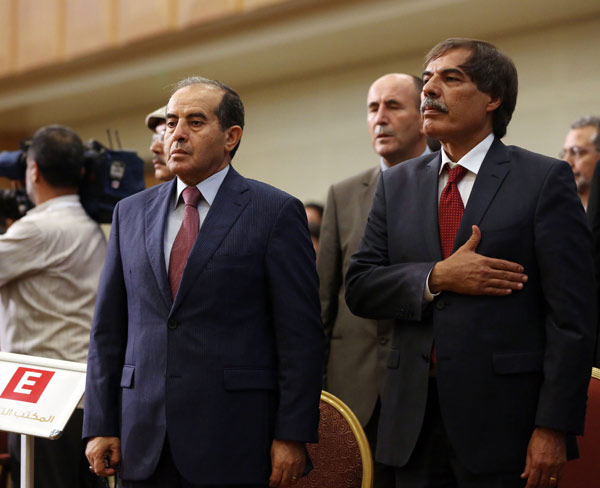Libya’s ruling council hands over power
Libya’s ruling council handed over power to a newly elected national assembly on Wednesday in the North African country’s first peaceful transition of power in its modern history but which comes amid heightened violence.
 |
|
Mahmoud Jibril (left), Libya's interim prime minister during last year's war and now head of the National Forces lliance, and Dr Ali Altarhuni, centrist National Movement head, stand during the transfer of authority ceremony in Tripoli on Wednesday. MAHMUD TURKIA / AGENCE FRANCE-PRESSE |
In a late-night ceremony held under tight security in Tripoli, the National Transitional Council, political arm of the opposition forces that toppled Muammar Gadhafi a year ago, handed over to the national congress, elected in July.
NTC Chairman Mustafa Abdel Jalil symbolically passed on the reins to the oldest member of the new 200-member assembly, Mohammed Ali Salim.
“The National Transitional Council hands over the constitutional duties for leading the state to the general national congress, which from now on is the sole legitimate representative of the Libyan people,” Jalil said to loud cheers.
In a speech, Jalil, who announced he would retire after ending his NTC chief post, acknowledged “mistakes” had been made during an “extraordinary” transitional period and said security and disarmament issues had not been resolved in time.
Ensure security
The NTC, which was established in the then rebel stronghold of Benghazi in February 2011, has served as Libya’s ruling authority since the fall of Gadhafi in 2011.
Jalil also admitted the NTC had failed to find a solution to the country’s refugee crisis, which he called a “real tragedy”, and to guarantee the security the Libyan people expected.
Mohammed Toumi, a member of parliament, said one of the most urgent tasks was to ensure security and collect weapons, while at the same time cause no confrontations with those rebels who had refused to lay down their weapons despite Gadhafi’s ouster.
Frequent violence in the run-up to the transition has demonstrated the country’s precarious stability and fragile security situation.
Last week, a huge blast hit a military intelligence headquarters in Benghazi.
Reuters—Xinhua—Ap





















